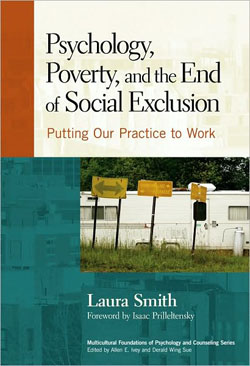First Edition: Putting Poverty on the Table
Laura Smith calls for psychology to acknowledge a pervasive problem
Laura Smith calls for psychology to acknowledge a pervasive problem
By EMILY ROSENBAUM
“DON’T EVER BE ASHAMED OF YOUR PEOPLE. They worked hard all their lives.”
Laura Smith, TC Assistant Professor of Counseling and Clinical Psychology, took these words, spoken by her grandfather at the kitchen table, to heart. Hailing from the mountains of Appalachia, in West Virginia, Smith’s family was poor and hard working. Yet, as Smith recounts, this pairing—poverty and strength—has not been well-represented in a mainstream media that depicts poor mountain people as “dysfunctional in-breeders, lazy moonshiners or the Beverly Hillbillies.”
In her recent book, Psychology, Poverty, and the End of Social Exclusion: Putting Our Practice to Work, published
by Teachers College Press, Smith calls for “a new perspective to our understanding of poverty...that will suggest new horizons of service and advocacy that go beyond sympathy, charity and conventional treatment modalities.” In other words, poverty is not simply a lack of money: it is a dynamic within the larger context of social class and hierarchy that should be considered by therapists who provide counseling to those who are poor.
“In the psychology field, there are lots of sincere altruistic intentions,” Smith says. “My hope is that this book will invite people to take a step back and look at the whole system.”
For clinicians, whose primary focus is their one-on-one relationship with clients, the idea of considering social hierarchy is relatively new. “It’s just not a traditional part of how we work,” says Smith, who points out that mental health professionals must also examine how they, too, are part of the system. That is, what is the therapist’s own hierarchical position, and how might that be relevant in the clinical setting?
Psychology, Poverty, and the End of Social Exclusion provides concrete methods for professionals to incorporate such new considerations in their daily practices. Drawing on extensive research from her colleagues, Smith also dedicates a chapter of her book to firsthand accounts of people living in poverty. Or as Theresa Funicello, a welfare mother, says, “How do you make public what so many people more powerful than you are trying their damnedest to keep secret?”
Published Thursday, Dec. 15, 2011
